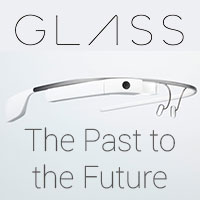Science-fiction has envisioned worlds where cybernetic enhancements are as common as clothing, and where everyone is permanently plugged into some kind of global network. These worlds usually exist in a far-off future where such technologies have become part of everyday life.
But even in these futuristic settings, there was a point when these technologies were not commonplace, when they were only just beginning to emerge. A point when only one in ten people had cybernetic attachments, and only on one limb.
Google Glass could just be the precursor to such a future. People walking around with facial recognition, video recording, and internet access attached to their eyes are something you’d only expect to find in a story about robot assassins. Now, if only it had lasers.
Highlights of Contents
What is Google Glass?
Google Glass aims to capture all the functionality of a smartphone, but make it available through a pair of glasses worn on your head rather than a device held in your hand.
Augmented reality is the term for technologies that use digital input to enhance our perception of the physical world. Google hopes to make augmented reality wearable, and if it has its way, the days of reaching for your phone if you want to take a picture, make a call, or access the internet may soon be over. All you have to do tap the touch pad on the side of your head, or use voice command and you’re good to go.

More about Google Glass
- The data is displayed on the upper right so as not to obstruct your vision. It is the equivalent of looking at a 25-inch high-definition screen from eight feet away, according to Google.
- The camera is capable of recording or photographing whatever you perceive through your first-person point-of-view.
- Data in the form of text, images, and video is displayed on the screen, allowing you to conduct video conferences, view maps, or read emails without turning your head.
- Sound is provided through “bone conduction” rather than a speaker, meaning it creates vibrations that travel through your skull to your inner ear.
- Built-in facial recognition technology gives the ability to recognize people you know in a crowd, and potentially to access information on someone just by looking at them.
- Compatibility with Google Translate means that words spoken to you in a foreign language can be translated and displayed onscreen in your preferred language.
Groundbreaking or Gimmick?
For all that, Google Glass will not replace the smartphone for a while. Certain features, GPS, for example, are not included in its functionality, meaning that Glass will need to be tethered to a smartphone for apps, such as Google Maps, to achieve optimal efficiency.
This has led some to speculate that in its current state Google Glass is little more than a gimmick. Allthingsd.com claimed that, while the device may eventually emulate the success of the iPhone, for now it’s closer to being a Newton (Apple’s failed Personal Digital Assistant technology).
Add to that safety concerns regarding use of the device while operating a motor vehicle, or any other circumstance where the distraction of the screen might pose a risk. Naturally, there are also privacy concerns arising from the inability to know whether or not you are being recorded or photographed. Some establishments have gone so far as to preemptively ban the device.
Such concerns are likely to accompany any groundbreaking technology; the question is whether they outweigh the multitude of potential applications for Google Glass, and the benefits it can provide in areas such as:
- Marketing: Google Glass presents numerous possibilities when it comes to engaging the audience, with the ability to pinpoint the user’s locations at specific times of day (though only when the user grants permission, according to Google policies). This provides data on their preferred activities that can assist in behavioral targeting.
- Education: Students will be able to record lectures and access the information at any time, and the interface provides a convenient way for both students and teachers to obtain research data from the web, wherever they may be.
- Travel: Apps such as Wikitude can identify landmarks and provide data pulled from Wikipedia, or point the user in the direction of restaurants and museums, etc.
- Business: Video conferencing will enable global business meetings to be joined from anywhere and at any time.
Google Glass is currently set for a late 2013 to early 2014 release. Though still in its infancy, and facing criticism due to safety and privacy concerns, in time 2014 may be remembered as the year Google opened our eyes to the potential of augmented reality.
